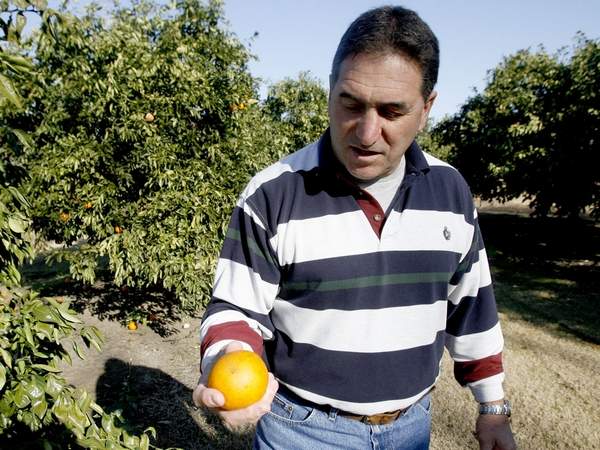Freeze troubles all over the place...
http://www.dailycomet.com/article/20100117/ARTICLES/100119474/1214
Citrus growers rocked by recent cold snap
 Matt Stamey/Staff
Matt Stamey/Staff
Terry Breaux describes how some of his crop of oranges have been destroyed by the recent cold weather.
By Kathrine Schmidt
Staff Writer
Published: Sunday, January 17, 2010 at 6:01 a.m.
Last Modified: Saturday, January 16, 2010 at 10:14 p.m.
BAYOU BLACK The rows of orange trees, weighed down with fruit, look like the picture of bounty.
But the crinkled leaves, off-color skins and whistling wind tell a different story,
All of the fruit still on the trees, approximately a third of Terry Breaux's crop, is ruined, thanks to a freeze that sunk local temperatures into the low 20s for hours at a time. Those conditions can be lethal for citrus, the freeze turning fresh pulp into inedible mush.
It's like a sponge, says Breaux, squeezing a ruined fruit as he surveyed the damage last week. It's Mother Nature. When it's good, it's good. When it's bad, it's bad.
A part-time farmer of about 950 satsuma, navel orange, grapefruit and lemon trees on longtime family property on Bayou Black, Breaux said he worked with family and friends to pick as much fruit as they could before it spoiled but there was only so much they could do.
It will be a few weeks, however, before farmers know the full extent of the damage and how well their trees weathered the freeze. If the bark splits and the sap starts pouring out, that means the tree is dead and he'll have to replant, Breaux said. But if the damage is limited to some branches, the dead wood can be pruned and the plant can be saved.
Breaux, 54, who farms as a hobby in his spare time from working as a paint salesman, is optimistic about his orchard. It is sheltered by woods, cutting down the wind exposure, he reasoned. But he won't know for sure for weeks, perhaps months.
Barton Joffrion, of Houma's local branch of the LSU Ag Center, said the citrus industry in Louisiana brings in between $6.5 and $7.5 million each year, depending on the conditions. But deep freezes like this are fairly rare, he said. The last major freeze took place in 1989, he said, when producers lost most of their crops and trees and had to replant.
The concern is that people are going to have to start over, he said. The leaves start drying out, (the cold) kills the wood. It's a tropical plant.
Satsumas and kumquats are the hardiest citrus fruits, and can withstand temperatures of 22 to 23 degrees. Navel oranges can take 25- to 26-degree weather, while lemons and limes are the most fragile and freeze first.
Area temperatures dipped to lows of 22 degrees, 18 degrees and 12 degrees on Jan. 8, 9 and 10, according to Weather.com.
Some growers had already completed their harvests for the season, like John Rogers of Bourg.
We were over prior to the cold snap, he said. We normally finish around Christmastime. We were just fortunate.
Jerry Truck Gisclair, a part-time farmer in Larose and state representative, wasn't as lucky.
I've got leaves falling off the trees already. That is not a good sign, Gisclair said, saying the weather was the coldest he's seen. We're going to lose thousands and thousands of fruits that are still on the trees.
He estimates that of the fruit on his 1,600 trees, he will lose virtually all of his navel oranges and 10 to 15 percent of his satsumas. Depending on the damage to the orchard, that will likely be a hit of $75,000 to $125,000, he said.
His mercury on Jan. 9 registered at 20 degrees and on Jan. 10, the thermometer showed 22 degrees, he said. With their thick skins, it takes a lot for the frost to penetrate the fruits, he said.
I had navels that were frozen like a baseball, he said.
But the frigid weather hasn't been the only problem for farmers this year. They also say a sour economy and poor weather has weakened the demand for the fruit.
We went through a wet December month, which really hurt roadside sales, Gisclair said, who also sells his crop to distributors in Hammond and Baton Rouge. We did not get the big orders we get from the big food chain stores. I think that's directly attributable to the condition of the economy.
Both Gisclair and Joffrion said once the damage becomes more clear-cut, they will see what can be done to get some aid for affected farmers.
For now, it's patience and recovery.
The trees are in shock, Gisclair said. We just wait and pray right now.
Staff Writer Kathrine Schmidt can be reached at 857-2204 or kathrine.schmidt@houmatoday.com. 



